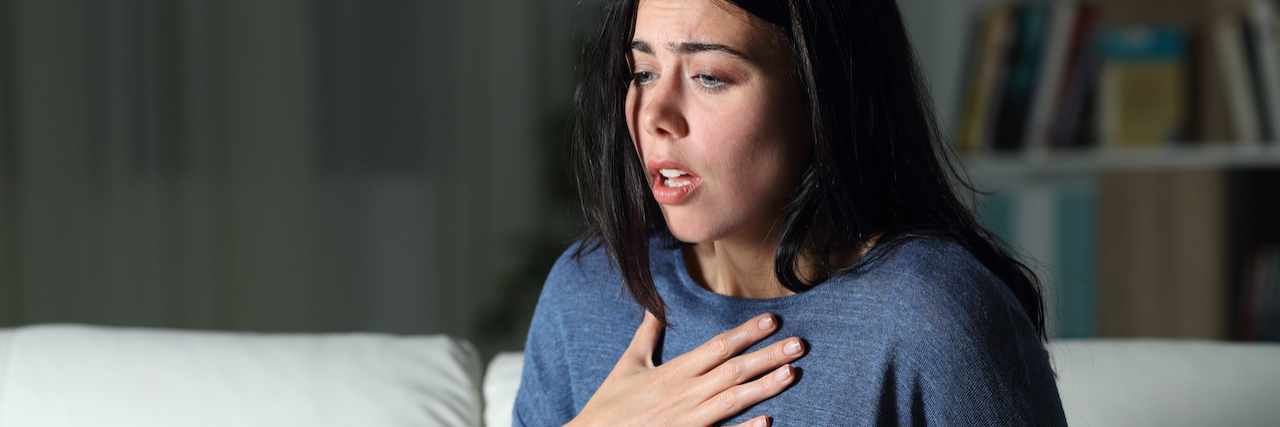How Can You Tell the Difference Between Anxiety and COVID-19 Symptoms?
As things develop during the COVID-19 pandemic, there’s one thing just about everybody has in common: A drastic increase in anxiety. Whether you’re worried about your health or the health of loved ones, trying to navigate sudden unemployment or wondering what happens next in the face of uncertainty, you’re not alone.
If you’ve experienced anxiety or panic before, you’ve probably experienced symptoms that manifest physically. You might find yourself breathing shallowly or ever experience flu-like aches. When we’re all on the look-out for potential COVID-19 symptoms — shortness of breath, cough and fever — those physical anxiety symptoms can ratchet your fear up even higher.
The best course of action if you’re concerned about your symptoms is to talk with your doctor. In the meantime, here’s what you need to know about how anxiety affects your body and the overlap of symptoms with COVID-19.
How Does Anxiety Affect Your Body?
Anxiety and panic can cause physical symptoms that may resemble early COVID-19 symptoms, including shortness of breath and even chills or aches and pains like you have the flu.
“Because the COVID-19 symptoms are so common to other illnesses and to panic attacks, it’s very easy to get into your own head and wonder about every moment that your breathing feels tight or you feel fatigued,” Liz Gustafson, Ph.D., a Los Angeles-based psychologist, told The Mighty.
Increased anxiety triggers a threat response in your sympathetic nervous system, part of your autonomic nervous system that regulates many of your body’s systems and responses, to prime you for an activated fight or flight survival response. Some of the ways you might experience anxiety physically include:
- Increased heart rate
- Heart palpitations
- Rapid breathing
- Tightness in the chest or chest pain
- Muscle aches due to contraction (to prime you for action)
- Digestive discomfort due to slowed stomach or intestine function
Below are some of the symptoms of COVID-19 that overlap with common physical signs of anxiety.
Shortness of Breath
COVID-19 causes a respiratory infection, which makes it more difficult to breathe. Reports indicate this can be mild to moderate, like feeling winded after a short walk from your bed to the bathroom, for example. In more severe COVID-19 cases, people may need oxygen or a ventilator to help them breathe.
Chills and Feeling Cold
To fight an illness, you may have a fever and increased body temperature designed to make it more difficult for a virus to survive in the body. Chills cause muscle contractions that help your body maintain and regulate the necessary higher temperature setting. COVID-19 causes a fever (and chills).
Flu-Like Aches and Pains
A fever can also cause body aches and pains and a feeling of weakness, which you might usually experience with the flu. COVID-19 causes similar body aches and pains for many people.
Digestive Symptoms
Preliminary research suggests that COVID-19 can cause digestive symptoms including a loss of appetite, diarrhea, nausea and vomiting.
COVID-19 Versus Anxiety Symptoms
If you’re having a hard time determining if the tightness in your chest and shallow breathing are related to your increased anxiety or a potential sign of COVID-19, you’re not alone. Because we’re still learning about the coronavirus, we can’t know exactly what symptoms it causes for most people. There are some clues we can look for:
- Physical anxiety symptoms should abate as your anxiety levels go back down and your nervous system calms down.
- COVID-19 symptoms will likely persist or worsen over time, regardless of your anxiety levels.
- You can also use a thermometer to keep an eye on your temperature to determine if you have a fever.
- Some early reports suggest that COVID-19 can cause other symptoms, like a sudden loss of smell or taste that can help you identify the virus.
And if there’s any doubt, contact your doctor about the symptoms you’re experiencing, and make sure to bring up the anxiety you’re feeling.
The Takeaway
Charles B. Nemeroff, M.D., Ph.D., the Anxiety and Depression Association of America‘s chief medical officer, advised people with physical anxiety reactions to watch for signs of cough, (persistent or worsening) shortness of breath and fever. If you do want to be screened for COVID-19, contact a doctor first and take care before going to an emergency room to reduce your potential exposure to the virus.
“Shortness of breath and other somatic symptoms that resemble the flu in general and COVID-19 in particular are often experienced by patients with anxiety disorders such as panic disorder,” Dr. Nemeroff said in a statement, adding:
During this time of very heightened concern about the spread of the coronavirus, many individuals, especially those with mood and anxiety disorders, are experiencing somatic symptoms that raised concern about potential infection with the virus. If you have a fever, shortness of breath and a cough, you should be screened preferably by a drive-through screening station now available in many locations.
Concerned about coronavirus? Stay safe using the tips from these articles:
Header image via AntonioGuillem/Getty Images

